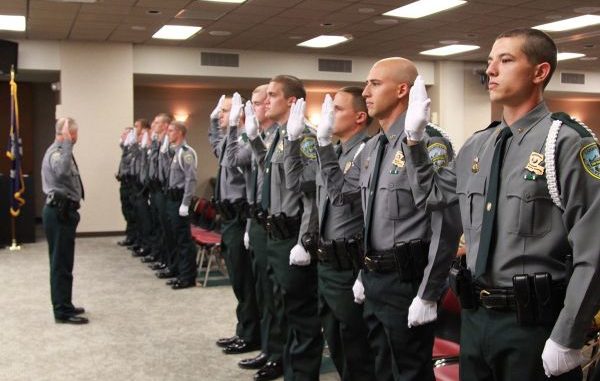
Even as children we all have an idea of what we want to be when we grow up. Fireman, policeman, doctor and nurse are all professions the kindergarten class has in its sights.
With age we become aware of the wide variety of career paths from which we may choose. Our experiences in life and exposure to the world around us lead us to select careers, and eventually we prepare for it and pursue it.
Growing up in a hunting and fishing family gave me a deep appreciation for wildlife and wild places, and a desire to protect and conserve those resources. So becoming a wildlife agent was a natural choice.
I applied to the Louisiana Department of Wildlife and Fisheries, and was interviewed for a wildlife management area warden position. My enthusiasm must have been obvious, since I was hired after the first interview and soon began my career.
The hiring and training process was different in those days. Those of us with law enforcement commissions were hired, commissioned and placed immediately in the field.
Training and supervision came from older officers, and we followed their lead and learned what we could while waiting for formal training.
From time to time, when enough new police officers were on the job in the various local and state law enforcement agencies, a generic Peace Officers Standards and Training (POST) Course was scheduled. These courses were held at the LSU Continuing Education Center on the main campus in Baton Rouge.
New wildlife agents were included in the class, which was usually eight weeks in length. Upon graduation it was back out to the field.
Any additional training came in the form of annual recertifications and any advanced classes the agent might be selected to attend.
The hiring and training processes are quite different — and better — today. To begin with, the minimum qualifications for a wildlife enforcement agent are 60 semester hours of college or two years of previous, full-time, paid law enforcement or three years active duty in the military with honorable discharge. I would not be surprised to see college requirements increased to a four-year degree; it has been considered.
Vacant positions resulting from retirements or resignations are not filled as they occur. Rather, when the number of vacant positions reaches a total usually amounting to a dozen or so, the Division of Law Enforcement announces hiring for the next academy class. Those wishing to apply must then submit online applications to LDWF Human Resources. Applications are reviewed and interviews are scheduled for qualified applicants.
The hiring panel made up of law enforcement and human resources staff members might interview more than 100 applicants for the dozen or so vacancies. So competition is stiff.
Following initial interviews, applicants making the cut are brought back for a physical evaluation. At that time each applicant is given the location of the position for which he or she is being considered and asked whether they are willing to accept the position, provided they successfully complete the remaining hiring process.
This is a vitally important question and one the applicant must give serious consideration before answering. In many cases, the new agent must relocate himself and his family to another parish in a different part of the state. This is never easy and requires a total commitment not only from the agent but his spouse and family.
In many cases it is a deal breaker for applicants who are unwilling or unable to move.
For those willing to accept the position offered, the process moves on to the next step: psychological evaluation. This evaluation benefits both the applicant and the agency, since the resulting opinion is whether the applicant is suitable for work as an armed law enforcement officer.
The evaluation also identifies areas where the applicant might have future problems on the job. In my experience as a supervisor, the psychological evaluations were pretty accurate and of great value.
Last in the hiring process is the background investigation. Investigators look into the applicant’s past for any criminal history or financial irresponsibility. Previous employers are interviewed, as are friends and neighbors. How someone has conducted themselves in the community is a good indicator of future behavior and community involvement.
Applicants surviving this rigorous process are given a date and time to report to the DWF Enforcement Division Training Academy in Baton Rouge. They are also sent a list of things they need to bring to the academy. Listed among those is a pair of running shoes; my advice is to make sure they are very good running shoes.
The start date of the academy is the day they officially begin employment with LDWF. The applicants are now cadets, and the first morning begins with physical training, including a run in formation. Every day for the rest of the cadet’s days in the academy will begin the same way.
The only difference is that the run will increase in distance.
Academy classes usually last from 22 to 24 weeks. Cadets report to the academy on a Sunday afternoon and are released on Friday each week.
The initial weeks of the academy are the POST Course described above. Following successful completion of POST, training focuses on a host of skills and training a wildlife enforcement agent needs in order to do the job.
Cadets receive training in orienteering, water rescue, boating, boat accident reconstruction, fish and waterfowl identification, waterfowl enforcement and ATV operation, just to name a few.
Wildlife agent training covers a much broader spectrum than that of other state and local law enforcement agencies, as well it should. The Enforcement Division learned long ago to expect a call for help any time boats or off road transportation is needed, particularly in remote or backcountry areas.
Graduation day marks a significant accomplishment for the cadet/agent. The newly sworn agent has every right to be proud of this achievement.
Graduates next report to their assigned districts, where they begin working in the field under the tutelage of a field training-officer (FTO).
When the FTO and district supervisor feel the young agent is ready, he or she will then begin working alone or paired with other agents as the assignment dictates.
Starting pay for the last cadet class that graduated on Feb. 12 was $35,609 per year, with pay increases that come with permanent employee status and possible merit increases along the career progression. Wildlife agents are state employees with benefits including paid overtime, health insurance, sick and annual leave and retirement.
The work is not easy and conditions can be harsh. Those who don’t like working in the heat and cold or don’t like getting dirty won’t like this.
And those who’s only interest is working in law enforcement and don’t care what kind of law enforcement are not a good fit for the job.
But if you love fish and wildlife, if you love the outdoors, if you are truly happy behind the wheel of a fast boat skimming across the water, and if you knew when you were a little kid that you wanted to be a game warden when you grew up, I think they might want to talk to you over at LDWF Division of Law Enforcement headquarters.
For more information on application and anticipated academy dates visit the Louisiana Department of Wildlife and Fisheries at www.wlf.louisiana.gov and click on “Employment.”




